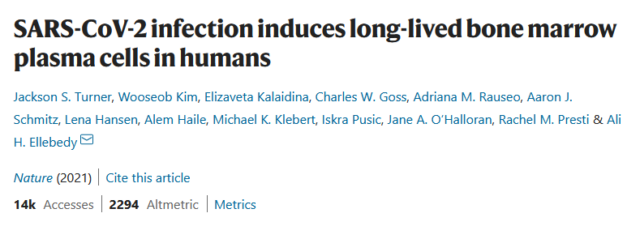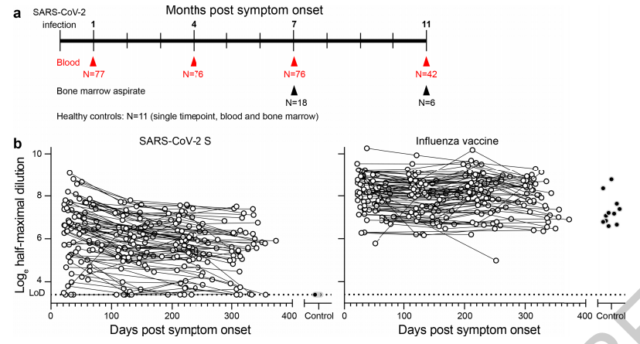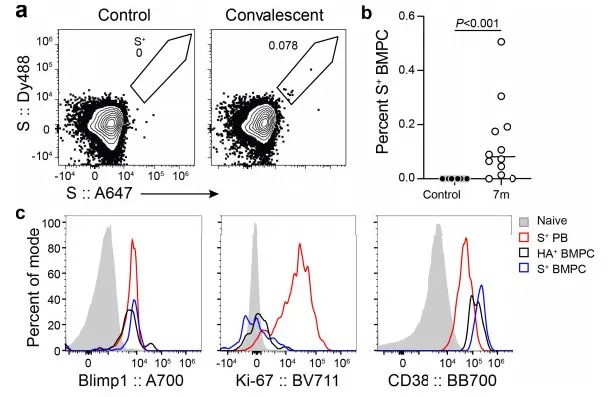Mild COVID-19 patients will to produce antibody for lifetime after recovered
- Normal Liver Cells Found to Promote Cancer Metastasis to the Liver
- Nearly 80% Complete Remission: Breakthrough in ADC Anti-Tumor Treatment
- Vaccination Against Common Diseases May Prevent Dementia!
- New Alzheimer’s Disease (AD) Diagnosis and Staging Criteria
- Breakthrough in Alzheimer’s Disease: New Nasal Spray Halts Cognitive Decline by Targeting Toxic Protein
- Can the Tap Water at the Paris Olympics be Drunk Directly?
Nature: After a mild COVID-19 patient recovers, the body will continue to produce antibody defenses for a lifetime
Mild COVID-19 patients will to produce antibody for lifetime after recovered. How long can people’s immunity to the new coronavirus last?
The new coronavirus (SARS-CoV-2) usually infects humans through the respiratory tract and causes damage to the respiratory system and various organs of the human body.
Since the outbreak, more than a year has passed, the virus is causing a global pandemic, and the number of cases continues to increase. As the epidemic evolves, a key question becomes more and more important. How long can people’s immunity to the new coronavirus last?
On May 24, 2021, researchers from the University of Washington published a research paper titled “SARS-CoV-2 infection induces long-lived bone marrow plasma cells in humans” in the top international journal “Nature”.
The study showed that after several months of recovery from a mild COVID-19 case, people still have immune cells secreting antibodies in their bodies, which can last a lifetime and continue to produce antibodies. Recurrent diseases are rare.

Earlier studies reported that after being infected with the virus that causes COVID-19, antibodies will rapidly weaken, which means that immunity will not last for long. The author of the study believes that this is a misunderstanding of the data. It is normal for the antibody level to decrease after acute infection, but it will not drop to zero.
During a viral infection, immune cells that produce antibodies rapidly multiply and circulate in the blood, resulting in extremely high levels of antibodies. Once the infection is resolved, most of these cells will die and blood antibody levels will drop. A small group of antibody-producing cells, called long-lived bone marrow plasma cells (BMPC), migrate to the bone marrow and settle there. They continuously secrete low levels of antibodies into the blood to help prevent re-encountering the virus.
To find out whether COVID-19 can bring long-lasting antibody protection, the researchers set out to study the bone marrow to check whether those who recovered from mild cases of COVID-19 have long-lived bone marrow plasma cells that can produce antibodies.
The research team recruited 77 participants, and they started collecting blood samples every three months starting one month after the initial infection. Most of the subjects had mild cases of COVID-19, and only 6 were hospitalized.
The researchers obtained bone marrow from 18 participants 7 to 8 months after the initial infection. Five of them returned after 4 months and provided a second bone marrow sample. For comparison, the researchers also obtained bone marrow from 11 people who had never had COVID-19.
As expected, in the first few months after infection, antibody levels in the blood of COVID-19 participants dropped rapidly, and then stabilized most of the time, and some antibodies were detectable even 11 months after infection.

SARS-CoV-2 infection causes persistent antibody production
In addition, among the 19 bone marrow samples from people infected with the COVID-19 virus, 15 contained antibody-producing cells specific to the COVID-19 virus. Four months later, the cells were still found in five people who returned to provide a second bone marrow sample. Among the 11 people who have never been infected with COVID-19, none of them had such antibody-producing cells in their bone marrow.
Researchers said that people with mild cases of COVID-19 can clear the virus two to three weeks after infection, so there will be no more virus causing an active immune response within 7 to 11 months after infection. These cells did not divide, they were static, they just secreted antibodies in the bone marrow. They have been doing this since the infection was resolved, and will do so indefinitely.

Long-lived bone marrow plasma cells quiescently secrete antibodies in the bone marrow
Researchers speculate that people who are infected but never show symptoms may also have lasting immunity. But for those who are more severely infected, whether they can be protected from the next round of diseases remains to be investigated.
Currently, researchers are studying whether vaccination can also induce the production of long-lived bone marrow plasma cells.
(source:internet, reference only)
Disclaimer of medicaltrend.org



